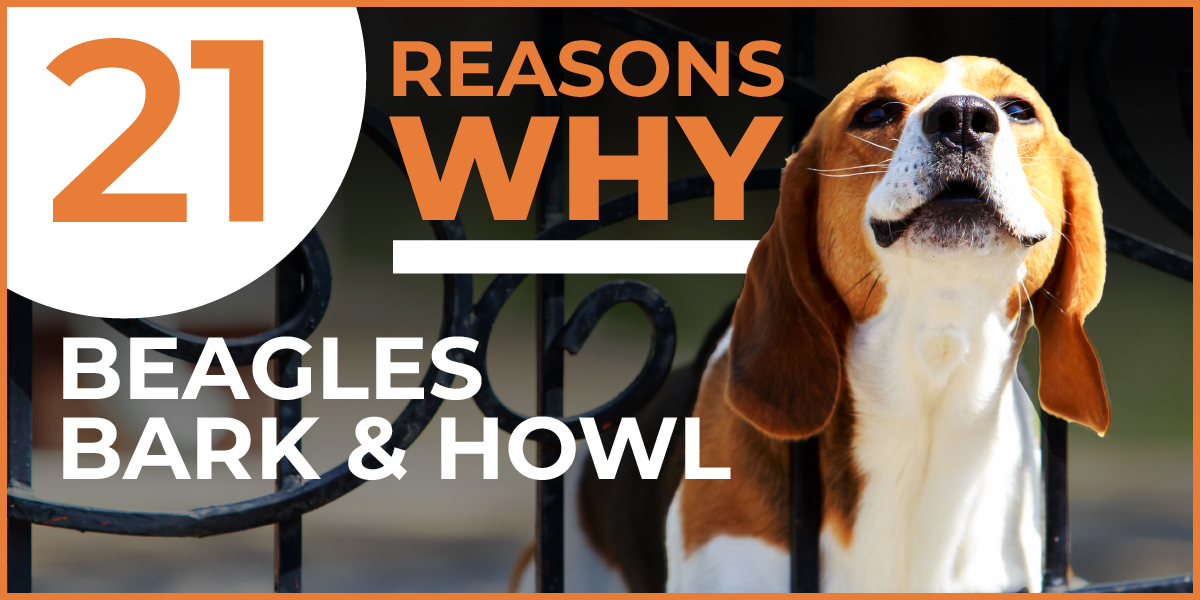As a professional in the field of dog behavior, it is not uncommon for pet owners to wonder why their beagle barks for no apparent reason. Beagles are known for their vocal nature, but when the barking becomes excessive or seems unprovoked, it can be frustrating and puzzling for owners. Understanding the reasons behind this behavior is key to finding a solution and ensuring the well-being of your furry friend.
Beagles have a instinctual tendency to bark, which can be attributed to their history as hunting dogs. Barking was an essential part of their role in assisting hunters, as they would use their voices to alert their owners to the presence of game. This trait has been passed down through generations, meaning even as domestic pets, beagles are prone to barking. However, excessive barking with no apparent reason may be a sign of boredom, anxiety, or a need for attention. Engaging your beagle in regular exercise, providing mental stimulation, and ensuring they have companionship and a structured routine can help reduce this type of barking behavior.
Beagles are known for their barking tendencies, but excessive or random barking may have underlying reasons. Some common causes include boredom, anxiety, fear, or territorial behavior. Identifying the trigger is key to addressing the issue. It’s essential to provide mental and physical stimulation, along with obedience training. Consultation with a professional dog trainer or behaviorist may be beneficial in understanding and modifying the behavior. Remember, beagles thrive on attention and exercise, so ensuring they have a balanced lifestyle can help reduce excessive barking.

Uncovering the Mystery of Excessive Barking in Beagles
Beagles are known for their friendly and affectionate nature, but sometimes they can exhibit excessive barking for no apparent reason. It can be frustrating for dog owners to deal with constant barking that seems to have no cause. However, there are several possible reasons why your beagle may be barking excessively. In this article, we will explore the different factors that may contribute to your beagle’s barking behavior and provide helpful tips on how to address them.
1. Territorial Instincts
One of the main reasons your beagle may be barking for no reason is their natural territorial instincts. Beagles are known to be vocal dogs and may bark to warn intruders or strangers approaching their territory. Even if there is no obvious threat or danger, your beagle may perceive certain situations or noises as a potential threat and respond with barking.
To address this behavior, it is important to socialize your beagle from a young age. Expose them to different environments, people, and animals so that they become more comfortable and less reactive to external stimuli. Additionally, providing a consistent routine and structure can help reduce anxiety and the need for excessive barking.
2. Boredom or Lack of Mental Stimulation
Another possible reason for your beagle’s excessive barking is boredom or lack of mental stimulation. Beagles are intelligent dogs that require regular mental and physical exercise to keep them engaged and content. If they are not provided with enough physical activity or mental stimulation, they may resort to barking as a way to release pent-up energy or seek attention.
To address this issue, make sure your beagle receives regular exercise and playtime. Engage them in interactive games and provide them with toys that challenge their minds. Consider enrolling them in obedience training or agility classes to stimulate their intellect and provide an outlet for their energy.
3. Separation Anxiety
Separation anxiety is another common reason a beagle may bark excessively. Beagles are pack animals that crave companionship, and when left alone for extended periods, they may become anxious and resort to barking as a way to express their distress. This behavior is often accompanied by other signs of anxiety, such as destructive chewing or excessive drooling.
To help alleviate separation anxiety, gradually acclimate your beagle to being alone for short periods, starting with just a few minutes and gradually increasing the duration. Provide them with interactive toys or treat-dispensing puzzles to keep them occupied while you are away. Consider using calming aids or seeking professional help if the anxiety persists.
4. Response to Environmental Stimuli
Beagles have keen senses of smell and hearing, which can make them more prone to barking in response to environmental stimuli. They may react to sounds, such as sirens, doorbells, or other animals in the vicinity. They may also be sensitive to certain smells or visual cues, triggering their barking instinct.
To manage this behavior, create a calm and secure environment for your beagle. Use white noise machines or calming music to drown out external sounds that may trigger barking. Close curtains or blinds to minimize visual stimuli. Gradually desensitize your beagle to triggers by exposing them to low levels of the stimuli and rewarding calm behavior.
5. Lack of Proper Training
A lack of proper training can contribute to excessive barking in beagles. If your beagle has not been taught appropriate behaviors and commands, they may resort to barking as a way to communicate their needs or desires. It is essential to establish clear boundaries and teach your beagle basic obedience commands from an early age.
Invest in professional obedience training or enroll in training classes to help your beagle learn how to communicate and behave appropriately. Use positive reinforcement techniques, such as rewards and praise, to reinforce desired behaviors. Consistency and patience are key when teaching your beagle proper manners and reducing excessive barking.
Conclusion
Excessive barking in beagles can be caused by various factors, such as territorial instincts, boredom, separation anxiety, environmental stimuli, and lack of proper training. Understanding the underlying reasons for your beagle’s barking behavior is the first step towards addressing and managing it effectively. By providing socialization, mental stimulation, consistent training, and a calm environment, you can help your beagle become a well-behaved and less vocal companion.
In Summary
- Beagles may bark excessively due to their territorial instincts, boredom, separation anxiety, response to environmental stimuli, or lack of proper training.
- Socializing your beagle, providing mental and physical stimulation, and establishing a consistent training routine can help address excessive barking.
- Gradually acclimating your beagle to being alone, creating a calm environment, and using positive reinforcement techniques can help reduce separation anxiety and associated barking.
- Minimizing triggers, such as sounds or visual cues, and rewarding calm behavior can help manage barking in response to environmental stimuli.
- Investing in professional obedience training or attending training classes can teach your beagle appropriate behaviors and reduce excessive barking.
Key Takeaways: “why does my beagle bark for no reason?”
- Beagles are known for their vocal nature and may bark for various reasons.
- Some possible reasons for a beagle barking for no apparent reason include boredom, loneliness, or anxiety.
- It’s important to provide mental and physical stimulation to prevent excessive barking.
- Training and socialization can help address unwanted barking behavior in beagles.
- If your beagle continues to bark excessively, consulting with a veterinarian or professional dog trainer may be beneficial.
Frequently Asked Questions (FAQ)
Here are some commonly asked questions about why beagles bark for no reason.
1. Why does my beagle bark excessively?
Beagles are known for their strong vocal nature. Excessive barking in beagles can be due to various reasons, such as:
Firstly, beagles are a hunting breed, and barking is part of their instinct. They have a keen sense of smell and love to explore their surroundings, which can trigger their barking behavior.
Secondly, beagles are sociable dogs that seek attention. If they feel neglected or bored, they may resort to barking as a way to get your attention.
2. Can separation anxiety cause excessive barking in beagles?
Yes, separation anxiety can be a common cause of excessive barking in beagles. Beagles are pack animals that thrive on companionship. When left alone for long periods, they can become anxious and resort to barking as a way to cope with their anxiety.
If your beagle barks excessively when you’re away, it may indicate that they are experiencing separation anxiety. Consulting with a professional dog trainer or behaviorist can help address this issue effectively.
3. How can I prevent my beagle from barking excessively?
To prevent excessive barking in your beagle, consider the following strategies:
Firstly, provide regular exercise and mental stimulation to keep your beagle physically and mentally engaged. A tired beagle is less likely to engage in excessive barking.
Secondly, address any underlying anxiety or boredom issues. Beagles need companionship, so avoid leaving them alone for long periods. Consider hiring a dog walker or enrolling them in doggy daycare if you can’t be with them during the day.
4. Are there any training techniques to reduce excessive barking in beagles?
Yes, there are training techniques that can help reduce excessive barking in beagles:
Firstly, teach your beagle the “quiet” command. When they start barking, calmly say “quiet” and wait for a moment of silence. Reward them with treats and praise when they stop barking.
Secondly, desensitize your beagle to triggers that cause excessive barking. Gradually expose them to stimuli, such as other dogs or doorbells, and reward them for not barking. This helps them learn that barking is not necessary in every situation.
5. Could medical issues be causing my beagle to bark excessively?
Yes, it’s essential to rule out any underlying medical issues that could be causing your beagle to bark excessively. Pain, discomfort, or medical conditions such as hearing loss can contribute to changes in behavior, including increased barking.
If you’ve tried addressing behavioral and environmental factors but your beagle’s excessive barking persists, consult with a veterinarian to rule out any potential medical causes.

How To Stop Your BEAGLE Barking
If your beagle is barking for no reason, there could be several possible explanations.
First, it’s important to rule out any underlying medical issues that may be causing discomfort or pain. Consult a veterinarian to ensure your beagle is in good health.
Second, beagles are known for their strong sense of smell and may be barking at scents that are undetectable to humans. Consider providing mental stimulation through puzzle toys or scent-based activities.
Additionally, excessive barking may be a sign of boredom or a lack of exercise. Make sure your beagle is getting enough physical and mental stimulation through walks, playtime, and training sessions.
Finally, beagles are vocal by nature and may bark to communicate or express their emotions. Understanding and addressing the underlying reason for their barking can help minimize excessive or unnecessary barking.
By considering these factors and addressing any potential issues, you can work towards reducing your beagle’s barking and creating a more peaceful environment for both you and your pet.
